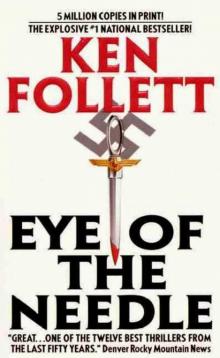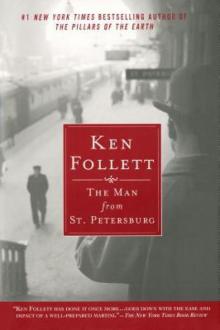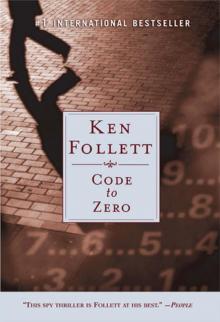- Home
- Ken Follett
the Third Twin (1996) Page 2
the Third Twin (1996) Read online
Page 2
She would fix French toast for breakfast and send Jeannie and Patty to school in clean dresses, then do her hair and make up her face—you had to look smart, working in a salon—and always leave a spotless kitchen with a plate of cookies on the table for the girls when they came back. On Sundays the three of them cleaned the apartment and did the laundry together. Mom had always been so capable, so reliable, so tireless, it was heartbreaking to see the forgetful, complaining woman on the bed.
Now she frowned, as if puzzled, and said: “Jeannie, why have you got a ring in your nose?”
Jeannie touched the delicate silver band and gave a wan smile. “Mom, I had my nostril pierced when I was a kid. Don’t you remember how mad you got about it? I thought you were going to throw me out on the street.”
“I forget things,” Mom said.
“I sure remember,” said Patty. “I thought it was the greatest thing ever. But I was eleven and you were fourteen, and to me everything you did was bold and stylish and clever.”
“Maybe it was,” Jeannie said with mock vanity.
Patty giggled. “The orange jacket sure wasn’t.”
“Oh, God, that jacket. Mom finally burned it after I slept in it in an abandoned building and got fleas.”
“I remember that,” Mom said. “Fleas! A child of mine!” She was still indignant about it, fifteen years later.
Suddenly the mood was lighter. Reminiscing had reminded them of how close they were. It was a good moment to leave. “I’d better go,” Jeannie said, standing up.
“Me too,” said Patty. “I have to make dinner.”
However, neither woman moved toward the door. Jeannie felt she was abandoning her mother, deserting her in a time of need. Nobody here loved her. She should have family to look after her. Jeannie and Patty should stay with her, and cook for her, and iron her nightgowns, and turn the TV to her favorite show.
Mom said: “When will I see you?”
Jeannie hesitated. She wanted to say, “Tomorrow, I’ll bring you your breakfast and stay with you all day.” But it was impossible: she had a busy week at work. Guilt flooded her. How can I be so cruel?
Patty rescued her, saying: “I’ll come tomorrow, and bring the kids to see you, you’ll like that.”
Mom was not going to let Jeannie get off that easily. “Will you come too, Jeannie?”
Jeannie could hardly speak. “As soon as I can.” Choking with grief, she leaned over the bed and kissed her mother. “I love you, Mom. Try to remember that.”
The moment they were outside the door, Patty burst into tears.
Jeannie felt like crying too, but she was the older sister, and she had long ago gotten into the habit of controlling her own emotions while she took care of Patty. She put an arm around her sister’s shoulders as they walked along the antiseptic corridor. Patty was not weak, but she was more accepting than Jeannie, who was combative and willful. Mom always criticized Jeannie and said she should be more like Patty.
“I wish I could have her at home with me, but I can’t,” Patty said woefully.
Jeannie agreed. Patty was married to a carpenter called Zip. They lived in a small row house with two bedrooms. The second bedroom was shared by her three boys. Davey was six, Mel four, and Tom two. There was nowhere to put a grandma.
Jeannie was single. As an assistant professor at Jones Falls University she earned thirty thousand dollars a year—a lot less than Patty’s husband, she guessed—and she had just taken out her first mortgage and bought a two-room apartment and furnished it on credit. One room was a living room with a kitchen nook, the other a bedroom with a closet and a tiny bathroom. If she gave Mom her bed she would have to sleep on the couch every night; and there was no one at home during the day to keep an eye on a woman with Alzheimer’s. “I can’t take her either,” she said.
Patty showed anger through her tears. “So why did you tell her we would get her out of there? We can’t!”
They stepped outside into the torrid heat. Jeannie said: “Tomorrow I’ll go to the bank and get a loan. We’ll put her in a better place and I’ll add to the insurance money.”
“But how will you ever pay it back?” said Patty practically.
“I’ll get promoted to associate professor, then full professor, and I’ll be commissioned to write a textbook and get hired as a consultant by three international conglomerates.”
Patty smiled through her tears. “I believe you, but will the bank?”
Patty had always believed in Jeannie. Patty herself had never been ambitious. She had been below average at school and had married at nineteen and settled down to raise children without any apparent regrets. Jeannie was the opposite. Top of the class and captain of all sports teams, she had been a tennis champion and had put herself through college on sports scholarships. Whatever she said she was going to do, Patty never doubted her.
But Patty was right, the bank would not make another loan so soon after financing the purchase of her apartment. And she had only just started as assistant professor: it would be three years before she was considered for promotion. As they reached the parking lot Jeannie said desperately: “Okay, I’ll sell my car.”
She loved her car. It was a twenty-year-old Mercedes 230C, a red two-door sedan with black leather seats. She had bought it eight years ago, with her prize money for winning the May-fair Lites College Tennis Challenge, five thousand dollars. That was before it became chic to own an old Mercedes. “It’s probably worth double what I paid for it,” she said.
“But you’d have to buy another car,” Patty said, still remorselessly realistic.
“You’re right.” Jeannie sighed. “Well, I can do some private tutoring. It’s against JFU’s rules, but I can probably get forty dollars an hour teaching remedial statistics one-on-one with rich students who have flunked the exam at other universities. I could pick up three hundred dollars a week, maybe; tax-free if I don’t declare it.” She looked her sister in the eye. “Can you spare anything?”
Patty looked away. “I don’t know.”
“Zip makes more than I do.”
“He’ll kill me for saying this, but we might be able to chip in seventy-five or eighty a week,” Patty said at last. “I’ll get him to put in for a raise. He’s kind of timid about asking, but I know he deserves it, and his boss likes him.”
Jeannie began to feel more cheerful, although the prospect of spending her Sundays teaching backward undergraduates was dismal. “For an extra four hundred a week we might get Mom a room to herself with her own bathroom.”
“Then she could have more of her things about her, ornaments and maybe some furniture from the apartment.”
“Let’s ask around, see if anyone knows of a nice place.”
“Okay.” Patty was thoughtful. “Mom’s illness is inherited, isn’t it? I saw something on TV.”
Jeannie nodded. “There’s a gene defect, AD3, that’s linked to early-onset Alzheimer’s.” It was located at chromosome 14q24.3, Jeannie recalled, but that would not mean anything to Patty.
“Does that mean you and I will end up like Mom?”
“It means there’s a good chance we will.”
They were both silent for a moment. The thought of losing your mind was almost too grim to talk about.
“I’m glad I had my children young,” Patty said. “They’ll be old enough to look after themselves by the time it happens to me.”
Jeannie noted the hint of reproof. Like Mom, Patty thought there was something wrong with being twenty-nine and childless. Jeannie said: “The fact that they’ve found the gene is also hopeful. It means that by the time we’re Mom’s age, they may be able to inject us with an altered version of our own DNA that doesn’t have the fatal gene.”
“They mentioned that on TV. Recombinant DNA technology, right?”
Jeannie grinned at her sister. “Right.”
“See, I’m not so dumb.”
“I never thought you were dumb.”
Patty said thoughtfully: “
The thing is, our DNA makes us what we are, so if you change my DNA, does that make me a different person?”
“It’s not just your DNA that makes you what you are. It’s your upbringing too. That’s what my work is all about.”
“How’s the new job going?”
“It’s exciting. This is my big chance, Patty. A lot of people read the article I wrote about criminality and whether it’s in our genes.” The article, published last year while she was still at the University of Minnesota, had borne the name of her supervising professor above her own, but she had done the work.
“I could never figure out whether you said criminality is inherited or not.”
“I identified four inherited traits that lead to criminal behavior: impulsiveness, fearlessness, aggression, and hyperactivity. But my big theory is that certain ways of raising children counteract those traits and turn potential criminals into good citizens.”
“How could you ever prove a thing like that?”
“By studying identical twins raised apart. Identical twins have the same DNA. And when they’re adopted at birth, or split up for some other reason, they get raised differently. So I look for pairs of twins where one is a criminal and the other is normal. Then I study how they were raised and what their parents did differently.”
“Your work is really important,” Patty said.
“I think so.”
“We have to find out why so many Americans nowadays turn bad.”
Jeannie nodded. That was it, in a nutshell.
Patty turned to her own car, a big old Ford station wagon, the back full of brightly colored kiddie junk: a tricycle, a folded-down stroller, an assortment of rackets and balls, and a big toy truck with a broken wheel.
Jeannie said: “Give the boys a big kiss from me, okay?”
“Thanks. I’ll call you tomorrow after I see Mom.” Jeannie got her keys out, hesitated, then went over to Patty and hugged her. “I love you, sis,” she said. “Love you, too.”
Jeannie got in her car and drove away.
She felt jangled and restless, full of unresolved feelings about Mom and Patty and the father who was not there. She got on I-70 and drove too fast, weaving in and out of the traffic. She wondered what to do with the rest of the day, then remembered that she was supposed to play tennis at six then go for beer and pizza with a group of graduate students and young faculty from the psychology department at Jones Falls. Her first thought was to cancel the entire evening. But she did not want to sit at home brooding. She would play tennis, she decided: the vigorous exercise would make her feel better. Afterward she would go to Andy’s Bar for an hour or so, then have an early night.
But it did not work out that way.
Her tennis opponent was Jack Budgen, the university’s head librarian. He had once played at Wimbledon and, though he was now bald and fifty, he was still fit and all the old craft was there. Jeannie had never been to Wimbledon. The height of her career had been a place on the U.S. Olympic tennis team while she was an undergraduate. But she was stronger and faster than Jack.
They played on one of the red clay tennis courts on the Jones Falls campus. They were evenly matched, and the game attracted a small crowd of spectators. There was no dress code, but out of habit Jeannie always played in crisp white shorts and a white polo shirt. She had long dark hair, not silky and straight like Patty’s but curly and unmanageable, so she tucked it up inside a peaked cap.
Jeannie’s serve was dynamite and her two-handed cross-court backhand smash was a killer. There was not much Jack could do about the serve, but after the first few games he made sure she did not get many chances to use the backhand smash. He played a sly game, conserving his energy, letting Jeannie make mistakes. She played too aggressively, serving double faults and running to the net too early. On a normal day, she reckoned, she could beat him; but today her concentration was shot, and she could not second-guess his game. They won a set each, then the third went to 5–4 in his favor and she found herself serving to stay in the match.
The game went to two deuces, then Jack won a point and the advantage was to him. Jeannie served into the net, and there was an audible gasp from the little crowd. Instead of a normal, slower second service, she threw caution to the winds and served again as if it were a first service. Jack just got his racket to the ball and returned it to her backhand. She smashed it and ran to the net. But Jack was not as off balance as he had pretended to be, and he returned a perfect lob that sailed over her head and landed on the back line to win the match.
Jeannie stood looking at the ball, hands on her hips, furious with herself. Although she had not played seriously for years, she retained the unyielding competitiveness that made it hard to lose. Then she calmed her feelings and put a smile on her face. She turned around. “Beautiful shot!” she called. She walked to the net and shook his hand, and there was a ragged round of applause from the spectators.
A young man approached her. “Hey, that was a great game!” he said with a broad smile.
Jeannie took him in at a glance. He was a hunk: tall and athletic, with curly fair hair cut short and nice blue eyes, and he was coming on to her for all he was worth.
She was not in the mood. “Thanks,” she said curtly.
He smiled again, a confident, relaxed smile that said most girls were happy when he talked to them, regardless of whether he was making any sense. “You know, I play a little tennis myself, and I was thinking—”
“If you only play a little tennis, you’re probably not in my league,” she said, and she brushed past him.
Behind her, she heard him say in a good-humored tone: “Should I assume that a romantic dinner followed by a night of passion is out of the question, then?”
She could not help smiling, if only at his persistence, and she had been ruder than necessary. She turned her head and spoke over her shoulder without stopping. “Yes, but thanks for the offer,” she said.
She left the court and headed for the locker room. She wondered what Mom was doing now. She must have had dinner by this time: it was seven-thirty, and they always fed people early in institutions. She was probably watching TV in the lounge. Maybe she would find a friend, a woman of her own age who would tolerate her forgetfulness and take an interest in her photographs of her grandchildren. Mom had once had a lot of friends—the other women at the salon, some of her customers, neighbors, people she had known for twenty-five years—but it was hard for them to keep up the friendship when Mom kept forgetting who the hell they were.
As she was passing the hockey field she ran into Lisa Hoxton. Lisa was the first real friend she had made since arriving at Jones Falls a month ago. She was a technician in the psychology laboratory. She had a science degree but did not want to be an academic. Like Jeannie, she came from a poor background, and she was a little intimidated by the Ivy League hauteur of Jones Falls. They had taken to one another instantly.
“A kid just tried to pick me up,” Jeannie said with a smile.
“What was he like?”
“He looked like Brad Pitt, but taller.”
“Did you tell him you had a friend more his age?” Lisa said. She was twenty-four.
“No.” Jeannie glanced over her shoulder, but the man was nowhere in sight. “Keep walking, in case he follows me.”
“How could that be bad?”
“Come on.”
“Jeannie, it’s the creepy ones you run away from.”
“Knock it off!”
“You might have given him my phone number.”
“I should have handed him a slip of paper with your bra size on it, that would have done the trick.” Lisa had a big bust.
Lisa stopped walking. For a moment Jeannie thought she had gone too far and offended Lisa. She began to frame an apology. Then Lisa said: “What a great idea! ‘I’m a 36D, for more information call this number.’ It’s so subtle, too.”
“I’m just envious, I always wanted hooters,” Jeannie said, and they both giggled. “It’s true,
though, I prayed for tits. I was practically the last girl in my class to get my period, it was so embarrassing.”
“You actually said, ‘Dear God, please make my tits grow,’ kneeling beside your bed?”
“Actually I prayed to the Virgin Mary. I figured it was a girl thing. And I didn’t say tits, of course.”
“What did you say, breasts?”
“No, I figured you couldn’t say breasts to the Holy Mother.”
“So what did you call them?”
“Bristols.”
Lisa burst out laughing.
“I don’t know where I got that word from, I must have overheard some men talking. It seemed like a polite euphemism to me. I never told anyone that before in my life.”
Lisa looked back. “Well, I don’t see any good-looking guys following us. I guess we shook off Brad Pitt.”
“It’s a good thing. He’s just my type: handsome, sexy, overconfident, and totally untrustworthy.”
“How do you know he’s untrustworthy? You only met him for twenty seconds.”
“All men are untrustworthy.”
“You’re probably right Are you coming to Andy’s tonight?”
“Yeah, just for an hour or so. I have to shower first.” Her shirt was wet through with perspiration.
“Me too.” Lisa was in shorts and running shoes. “I’ve been training with the hockey team. Why only for an hour?”
“I’ve had a heavy day.” The game had distracted Jeannie, but now she winced as the agony came flooding back. “I had to put my mom into a home.”
“Oh, Jeannie, I’m sorry.”
Jeannie told her the story as they entered the gymnasium building and went down the stairs to the basement. In the locker room Jeannie caught sight of their reflection in the mirror. They were so different in appearance that they almost looked like a comedy act. Lisa was a little below average height, and Jeannie was almost six feet. Lisa was blond and curvy, whereas Jeannie was dark and muscular. Lisa had a pretty face, with a scatter of freckles across a pert little nose and a mouth like a bow. Most people described Jeannie as striking, and men sometimes told her she was beautiful, but nobody ever called her pretty.

 The Pillars of the Earth
The Pillars of the Earth Eye Of The Needle
Eye Of The Needle Lie Down With Lions
Lie Down With Lions Winter of the World
Winter of the World Triple
Triple World Without End
World Without End Fall of Giants
Fall of Giants Jackdaws
Jackdaws Hornet Flight
Hornet Flight Whiteout
Whiteout A Dangerous Fortune
A Dangerous Fortune The Man From St. Petersburg
The Man From St. Petersburg A Column of Fire
A Column of Fire The Hammer of Eden
The Hammer of Eden On Wings of Eagles
On Wings of Eagles The Evening and the Morning
The Evening and the Morning The Key to Rebecca
The Key to Rebecca Code to Zero
Code to Zero Paper Money
Paper Money A Place Called Freedom
A Place Called Freedom The Modigliani Scandal
The Modigliani Scandal Triple (1991)
Triple (1991) A Dangerous Fortune (1994)
A Dangerous Fortune (1994) A Place Called Freedom (1995)
A Place Called Freedom (1995) Winter of the World (Century Trilogy 2)
Winter of the World (Century Trilogy 2) Code to Zero (2000)
Code to Zero (2000) On Wings Of Eagles (1990)
On Wings Of Eagles (1990) Storm Island
Storm Island Fall of Giants (The Century Trilogy)
Fall of Giants (The Century Trilogy) the Third Twin (1996)
the Third Twin (1996) The Modigliani Scandal (1976)
The Modigliani Scandal (1976) Night Over Water
Night Over Water